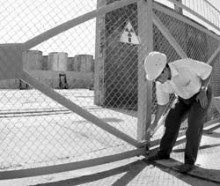Ukraine has just participated a second time in a meeting of the 42 countries that signed the Joint Convention on the Safety of Spent Fuel Management and the Safety of Radioactive Waste Management. Olena Mykolaichuk, chairperson of the State Nuclear Regulatory Committee of Ukraine, said that this time the participants noted Ukraine’s systematic nuclear safety legislation and our reliable nuclear emergency systems. She also pointed out that an increasing number of countries, including Ukraine, are paying more attention to public consultations when implementing spent nuclear fuel and waste management plans.
This is an acute issue in Ukraine. By 2010, when the Russian Federation will start returning highly radioactive waste after recycling our spent nuclear fuel, Ukraine must build a centralized nuclear dump on its territory. Otherwise, the coordinated operation of Ukrainian nuclear power stations will be at risk. If there is no site for storing spent fuel, the nuclear stations’ power units may stop operating.
Ukraine is still using Russia’s nuclear recycling facilities. This service costs between 70 and 120 million dollars a year. The Russians want to be paid $700 for every kilo, whereas the net cost of this process is only half this amount.
Meanwhile, Ukraine has accumulated nuclear waste management experience. In fact, the nuclear power plant in Zaporizhia has its own nuclear dump site, but it can only handle local waste, which means that this experiment does not claim to be on a nationwide scale.
Mykolaichuk says, however, that a feasibility study of a centralized nuclear waste storage facility is nearing completion. The tender for its construction was won by Holtect International (US). Construction will take four years, just in time to cope with the return from Russia of supplies of recycled Ukrainian nuclear fuel. This dump will accommodate waste from the Rivne, Khmelnytsky, and Pivdennoukrainska nuclear stations. According to preliminary estimates, the construction and operation of this storage facility will cost approximately 520 million dollars over a period of 100 years.
Meanwhile, Ukraine has to pay nearly two billion dollars (at 2005 prices) to Russia’s special recycling plants that handle waste from those three Ukrainian nuclear power stations. The Zaporizhia nuclear plant already has a storage facility, so the annual savings amount to some 40 million dollars.
The central nuclear storage facility budget is estimated at some 400 million euros. The cost of the “launching complex” will reach 150 million euros and the expected “economic effect” (savings on spent fuel deliveries to Russia) is about 1.5 billion euros.
Before building the storage facility, nuclear experts plan to carry out public consultations and will discuss the project in parliament. However, the situation is so ominous that this project will probably not be abandoned even if it doesn’t receive support. If worse comes to worst, they will have to build such storage facilities in the vicinity of every nuclear power station. This option appears to require no public approval, and nuclear scientists note that in this case considerably larger budget appropriations will have to be spent.
Ukraine’s chief nuclear regulation official says that according to the most optimistic forecasts, this “centralized” nuclear waste storage facility may become a reality by the end of this year. Mykolaichuk believes that the blueprint must include not only a description of the construction of the storage facility but also transportation routes. She emphasizes that if the committee gives a negative assessment to the project, no construction license will be issued: “We are waiting for the documents and then we will make our decision.”
Be that as it may, Ukraine will have to cooperate with Russia on matters relating to spent nuclear fuel until 2010. Mykolaichuk says that Ukraine’s cooperation with Rostekhnadzor is ineffective because of “internal perturbations” in this structure. During the recent nuclear waste management conference her committee signed a work plan for the year with the Russian company. Among other things, it envisages solutions to joint technical problems. As for the economic aspects of cooperation with Rostekhnadzor, Mykolaichuk said that this is within the jurisdiction of Enerhoatom (the State Nuclear Energy Committee) and the Ministry of Fuel and Energy. But, in her opinion, no reductions in the cost of the Russians’ services should be expected.







